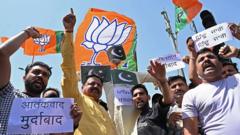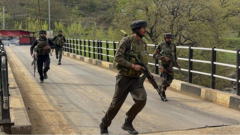Following the tragic death of 26 tourists in an attack in Pahalgam, India is under pressure to respond decisively, balancing military action with the risk of escalation in its fraught relations with Pakistan.
India Faces Dilemma After Pahalgam Attack on Tourists

India Faces Dilemma After Pahalgam Attack on Tourists
The deadly attack in Kashmir raises questions about India's response options and regional stability.
The recent assault in Pahalgam, Kashmir, which resulted in the deaths of at least 26 tourists, marks the deadliest militant violence in the region since 2019. The attack specifically targeted civilians, which has intensified the imperative for India to signal strength in response. This incident underscores the delicate balance India must navigate regarding Kashmir, an area of longstanding dispute with Pakistan.
In light of the tragedy, India has already implemented strategic measures, such as closing a crucial border crossing, pausing a vital water-sharing treaty, and expelling certain diplomats. Defence Minister Rajnath Singh announced intentions for a "strong response" aimed at both the direct aggressors and those orchestrating these assaults from behind the scenes. Analysts believe a military retaliation is imminent, with pressure mounting for a response that reflects India's resolve both to its domestic audience and to its rivals in Pakistan.
Military historian Srinath Raghavan highlights that the Indian government may feel compelled to react with significant force, especially given precedents set in 2016 and 2019, where Indian forces conducted cross-border strikes following deadly attacks. The tough challenge lies in deciding the timing and nature of such a response without escalating the situation to outright war.
Michael Kugelman, a foreign relations expert, pointed out that the high civilian casualty toll in Pahalgam complicates India's choices. He noted that any retaliation could serve a dual purpose: satisfying domestic pressure while attempting to restore deterrence against potential terrorist threats. Yet he cautioned that such actions could lead to a serious escalation with Pakistan.
India's potential responses may include a return to cross-border firing, a breach of the existing ceasefire, or even targeted airstrikes akin to those conducted in 2019. However, these options carry significant risks, particularly the potential for miscalculation leading to a broader conflict, notably considering both nations are nuclear-armed.
The challenge for India is to navigate this complicated scenario carefully. Any responsive measures taken will need to be perceived as prudent and measured rather than reckless, as missteps could ignite further violence. In the backdrop of this ongoing crisis, authorities must also address the perceived security lapses that made the attack possible, particularly as it occurred during the tourist season—periods typically deemed vulnerable yet vital for the region's economy.
As the situation unfolds, experts agree that every subsequent decision will influence not only the immediate implications for security in Kashmir but also the overarching dynamics of India-Pakistan relations. The need for careful strategy is paramount as the hopes for peace remain fragile amidst rising tensions.




















